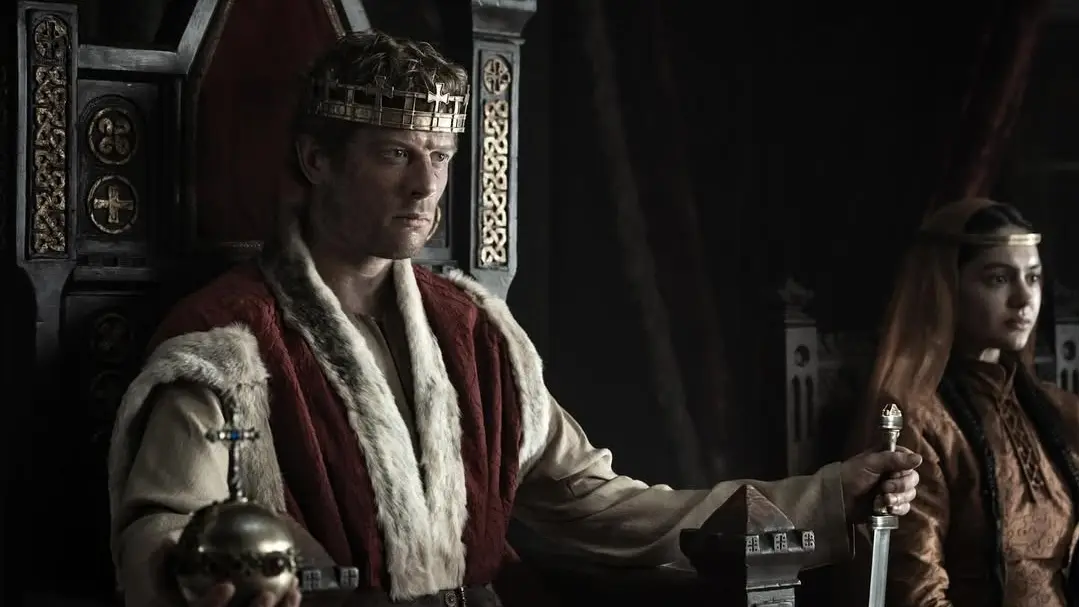King & Conqueror Episode 1 Ending Explained: Does the Battle of Hastings seal William’s destiny over Harold?
-
 King & Conqueror via Instagram @bbcpressoffice
King & Conqueror via Instagram @bbcpressofficeAs the opening shots of the BBC’s King & Conqueror written by Michael Robert Johnson unfold, the sounds of swords clashing and voices shouting explode - as you can only imagine on a 1066 battlefield. The bouncing camera records two men - Harold Godwinson (James Norton) and William of Normandy (Nikolaj Coster-Waldau) - with completely different plans, but both of them are fighting one battle at the Battle of Hastings.
The dramatic, ancient flash-forward in the episode hints at their fates and their personal vendetta, but does the climactic episode amount to William's inevitable fate as the conqueror of England? James Norton the Executive Producer said to RadioTimes:
“When this idea came along via our brilliant writer Mike Johnson, the first question was, ‘Why has it not been told before?’ And I think his stroke of genius was recognising that it’s not about telling the story of the battle itself, it’s about the relationship these men had in the lead-up to the battle.”
Episode 1 of King & Conqueror aired on August 24 at BBC One, teases us with the idea of fate, loyalty, and betrayal that are intertwined in their journeys. Let's dive into the framing of the ending and consider alternative perspectives on whether history's judgment was truly inevitable or if Harold and his decision-making could have turned the tide for England.
King & Conqueror : Episode 1 ending explained
The layered relationship between Harold and William in the ending of episode 1, resonated with fans the most. The series portrays them as allies-turned-adversaries, a bond forged in shared battles in Normandy.
James Norton, also an executive producer, emphasizes their “twisty, turny story” of friendship soured by ambition. Yet, historical accounts question this closeness. Huscroft argues they were never true friends, with William exploiting Harold’s oath for legitimacy.
The conclusion to the episode foreshadows this fracture; William’s cold glare and Harold's obstinacy suggest a betrayal too strong to be reconciled by destiny.
Could Harold have created an environment to avoid this conflict by adhering to his oath? The creative liberties that exist within the series are greater, through personal investments, in which a win for William feels less like destiny and more like a failing trust.
The battle of Hastings, as represented, was not as much swords beating swords as it was a battle of tactics. Harold's army, worn out from defeating Harald Hardrada at Stamford Bridge, was marching south, while William's army had just returned from the crossing of the English Channel and was fresh from Pevensey.
The documentary flash forward depicts Harold's shield wall (an Anglo-Saxon tactic) holding until the Normans' bravery feigned to retreat, causing chaos within Harold's men. This point within history implies that Harold's recklessness ended his fate.
If he had been more patient and called for more troops (as some historians argue), he could have outmanoeuvred William. The series frames this incident as a fundamental mistake, implying that William's ruthlessness in planning, juxtaposed with Harold's honor, made instinctive responses signal that destiny favoured the more cunning tactician.
King & Conqueror: A flash-forward to fate
The episode began with a visceral glimpse of the Battle of Hastings, where Harold and William shout each other’s names, their voices thick with history and rivalry. This isn’t just a fight for the crown — it’s personal. After this, the story goes back in time many years prior, when Harold warned his father, Earl Godwin, about treachery in Mercia, but was not taken seriously.
This information is significant to Harold’s struggle for respect and power, along with William's own struggles in Normandy, such as conspiracies and assassination plots.
The purpose of his flash forward is apparent - to engage the viewer with a potential climax. But it also raises a question - did this moment lock in William’s triumph, or was it a warning of Harold’s missed opportunities?
Historian Richard Huscroft notes that Harold and William likely met only once before 1066, when Harold, shipwrecked in Normandy, swore an oath to support William’s claim to the throne - a vow he later broke, setting the stage for betrayal.
Nikolaj Coster-Waldau said to RadioTimes:
“I didn’t know anything about this history, and once I started doing my research and reading about it, I was really surprised by how different Europe looked back then and how the influence of the Normans, the Vikings, how great that was at that time.”
Where to watch King & Conqueror
The BBC One aired the first episode of this brand new series at 9 PM on August 24. There are eight episodes in total, accessible on BBC iPlayer for UK viewers. If you are curious about this gripping retelling of 1066, go watch and decide for yourself - was William's victory preordained, or did Harold's decisions deliver him the crown?
Stay tuned for more such updates.